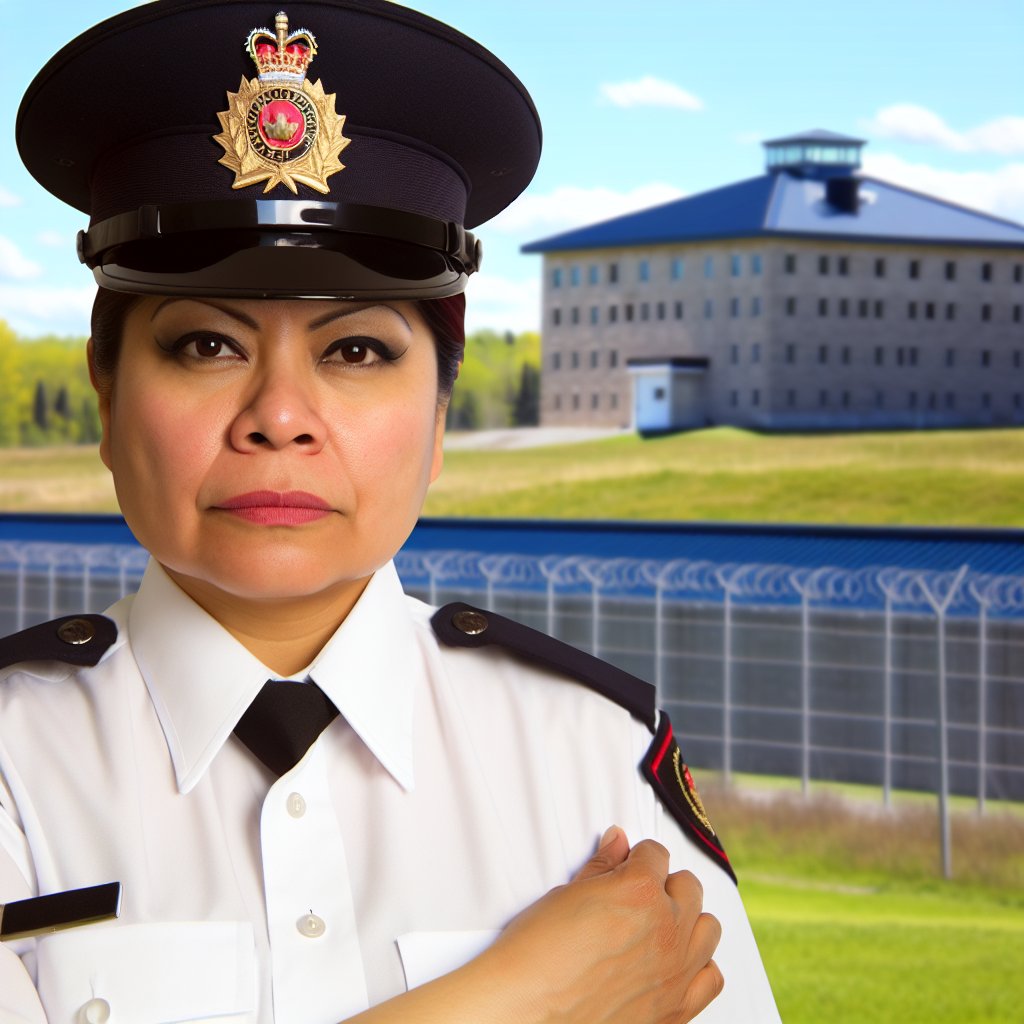Introduction to the Role of Correctional Officers
Correctional officers play a crucial role in ensuring public safety.
Their primary duty is to supervise individuals who have been arrested and are awaiting trial.
Additionally, they oversee inmates serving sentences in jails and prisons.
These officers help maintain order inside correctional facilities.
By enforcing rules and regulations, they ensure a safe environment for both inmates and staff.
Responsibilities of Correctional Officers
Correctional officers have various responsibilities that contribute to overall safety.
They conduct regular inspections to prevent contraband smuggling.
Moreover, they manage inmate movements within the facility.
Through documentation, they keep accurate records of inmate behavior and incidents.
Furthermore, they participate in inmate rehabilitation programs.
Challenges Faced by Correctional Officers
Working as a correctional officer comes with several challenges.
Officers often encounter stressful situations and high levels of tension.
They must constantly assess risks in an unpredictable environment.
Furthermore, they face potential violence from inmates.
This makes their role both demanding and critical for safety.
Importance of Training and Education
Proper training is essential for correctional officers to perform their duties effectively.
Many agencies provide continuous education to enhance skills and knowledge.
Effective training helps officers handle conflicts and emergencies better.
Additionally, it fosters better communication between officers and inmates.
This ultimately contributes to a healthier correctional environment.
History and Evolution of Correctional Practices
Early Correctional Systems
Correctional practices began in ancient civilizations over two thousand years ago.
Initially, they focused on physical punishment rather than rehabilitation.
Prisons in ancient Rome held individuals awaiting trial or execution.
Similarly, medieval Europe used dungeons to incarcerate offenders.
These early systems often lacked organization and humane treatment.
Unlock Your Career Potential
Visualize a clear path to success with our tailored Career Consulting service. Personalized insights in just 1-3 days.
Get StartedThe Birth of Modern Prisons
The Enlightenment sparked a shift in correctional attitudes during the 18th century.
Philosophers like Cesare Beccaria promoted humane reforms in justice systems.
In this context, the concept of prison emerged as a method of rehabilitation.
The Pennsylvania System introduced solitary confinement to encourage reflection.
Consequently, the goal shifted from punishment to moral reform.
The 19th and 20th Century Reforms
The 19th century saw the rise of the reformatory system in the United States.
This system emphasized education and vocational training for inmates.
As a result, many believed rehabilitation would reduce recidivism rates.
Progressively, however, overcrowding and underfunding plagued these facilities.
In response, the Progressive Era pushed for more comprehensive reforms.
Contemporary Correctional Practices
Today, correctional practices continue to evolve based on public safety needs.
Prison systems now emphasize rehabilitation, education, and mental health services.
Many facilities incorporate programs that reduce recidivism effectively.
While challenges remain, innovative approaches are emerging globally.
Additionally, community-based corrections offer alternatives to incarceration.
The Role of Technology
Advancements in technology have transformed correctional practices in recent years.
Modern surveillance and data management systems enhance security measures.
Moreover, virtual rehabilitation programs provide inmates with valuable resources.
As a result, technology plays a significant role in shaping corrections today.
The integration of these tools aims to create a more effective correctional system.
Key Responsibilities of Correctional Officers in Correctional Facilities
Maintaining Safety and Security
Correctional officers play a crucial role in maintaining safety within facilities.
They monitor inmate behavior consistently throughout their shifts.
This vigilance helps prevent incidents of violence and disturbances.
Moreover, they conduct regular inspections of the premises.
These inspections ensure that inmates do not possess contraband.
In addition, officers enforce rules and regulations effectively.
They respond swiftly to emergencies when they occur.
Furthermore, they supervise inmate movement across the facility.
Managing Inmate Behavior
Correctional officers manage inmate behavior through various strategies.
They employ conflict resolution techniques to de-escalate tensions.
Moreover, they are trained to recognize signs of potential unrest.
By intervening early, they prevent dangerous situations from escalating.
Additionally, they conduct behavioral assessments regularly.
These assessments help identify inmates who may need extra support.
Providing Support and Guidance
Officers also provide support and guidance to inmates.
They listen to inmate concerns during daily interactions.
This communication promotes a positive atmosphere within the facility.
Through mentorship programs, officers guide inmates in their rehabilitation.
They facilitate access to educational and vocational programs.
Documentation and Reporting
Documentation is a critical responsibility for correctional officers.
They maintain accurate records of daily activities and incidents.
This documentation supports investigations and enhances accountability.
Additionally, officers report any rule violations or unusual behaviors.
Prompt reporting ensures that appropriate action is taken.
Collaboration with Other Staff
Collaboration is essential for effective operations in correctional facilities.
Officers work closely with mental health professionals and social workers.
This teamwork helps address the unique needs of inmates.
Furthermore, they attend training sessions regularly.
These sessions improve their skills and knowledge about best practices.
Officers also collaborate with local law enforcement when necessary.
This partnership enhances overall public safety and security.
Delve into the Subject: Work Environment of Correctional Officers in Canadian Prisons
Impact of Correctional Officers on Inmate Rehabilitation
Building Trust and Relationships
Correctional officers play a vital role in establishing trust with inmates.
Through consistent interactions, they foster genuine relationships.
Such connections help create a supportive environment for rehabilitation.
Furthermore, they serve as role models for positive behavior.
Effective communication encourages inmates to express their challenges.
Implementing Rehabilitation Programs
Correctional officers are pivotal in implementing rehabilitation programs.
They deliver educational initiatives aimed at skill development.
These programs include job training and substance abuse counseling.
Officers also facilitate access to mental health resources.
Such support significantly improves inmates’ chances of success upon release.
Encouraging Personal Accountability
Correctional officers instill a sense of personal accountability in inmates.
They emphasize the importance of making good choices.
This approach helps inmates understand the consequences of their actions.
By promoting responsible behavior, officers aid in reducing recidivism.
Ultimately, this mindset fosters a commitment to personal growth.
Collaborating with Support Services
Correctional officers collaborate with various support services.
This teamwork ensures comprehensive rehabilitation for inmates.
They coordinate with social workers and mental health professionals.
Such collaboration enhances the ability to address individual needs.
Importantly, it creates a holistic approach to inmate rehabilitation.
See Related Content: Canadian Industries Hiring Environmental Officers Today
The Role of Correctional Officers in Preventing Recidivism
Building Relationships with Inmates
Correctional officers foster positive relationships with inmates.
These relationships encourage trust and communication.
As a result, inmates feel more supported during their time in prison.
This support can lead to improved behavior and cooperation.
Providing Rehabilitation Programs
Correctional officers play a vital role in rehabilitation.
They help implement programs aimed at reducing recidivism.
These programs often include educational and vocational training.
Officers monitor progress and provide feedback to inmates.
Success in these programs can significantly decrease reoffending.
Encouraging Positive Behavior
Correctional officers set expectations for inmate behavior.
They reinforce positive actions through encouragement and rewards.
This creates a more stable and secure environment.
Thus, inmates learn the value of good behavior.
Facilitating Access to Mental Health Services
Many inmates deal with mental health issues.
Correctional officers identify those who need help.
They facilitate access to mental health services and support.
Moreover, addressing mental health can reduce recidivism rates.
Promoting a Safe Environment
Safety within correctional facilities is crucial.
Correctional officers maintain order and security daily.
A safe environment promotes successful rehabilitation.
Inmates are less likely to reoffend in a positive atmosphere.
Collaboration with External Agencies
Correctional officers work with community organizations.
This collaboration helps prepare inmates for reentry.
Such connections provide resources for housing and employment.
Consequently, inmates can successfully reintegrate into society.
Gain More Insights: Communication Skills for Correctional Officers in Canada
Challenges Faced by Correctional Officers in Maintaining Public Safety
Understanding the Environment
Correctional officers work in a volatile environment.
Daily interactions with inmates present numerous challenges.
They often face threats to their safety on the job.
Violence can erupt without warning, leading to chaos.
Additionally, the need for constant vigilance is paramount.
Emotional and Mental Strain
The job demands high emotional resilience.
Officers frequently witness traumatic events.
This exposure can lead to job-related stress and burnout.
Furthermore, they may struggle with feelings of isolation.
Support systems within facilities can be limited.
High Inmate Populations
Correctional facilities often operate beyond their intended capacity.
Overcrowding increases tensions among inmates.
It also limits officers’ ability to manage groups effectively.
Consequently, incidents of violence can rise sharply.
Officers must adapt quickly to these changing dynamics.
Resource Limitations
Many correctional facilities face budget constraints.
Limited resources hinder training opportunities for officers.
Moreover, outdated equipment can compromise safety.
This situation often forces officers to improvise on the job.
They must develop creative solutions with inadequate funding.
Public Perception and Media Scrutiny
Correctional officers often battle negative public perceptions.
Media portrayal can exacerbate this issue significantly.
They may feel undervalued despite their crucial role.
This perception can affect morale within the ranks.
Furthermore, public scrutiny can complicate their duties.
Interpersonal Relationships
Building rapport with inmates is essential for safety.
However, trust must be earned over time.
Officers often walk a fine line between authority and empathy.
Successful communication can prevent conflicts from escalating.
Still, maintaining professional boundaries is crucial.
Learn More: Impact of Border Services Officers on Canadian Economy

Training and Skills Required for Effective Correctional Officers
Essential Training Programs
Correctional officers undergo rigorous training programs nationwide.
These programs cover various essential topics and scenarios.
Officers learn about the laws governing corrections and inmates’ rights.
Additionally, they gain insights into criminal psychology and behavior management.
Physical and Mental Preparedness
Physical fitness is crucial for correctional officers to perform their duties effectively.
Training includes self-defense techniques and emergency response strategies.
Moreover, mental resilience is equally important for handling stressful situations.
Officers engage in scenario-based training to develop conflict resolution skills.
Communication Skills
Effective communication is a cornerstone of a correctional officer’s role.
Officers learn to convey instructions clearly and assertively.
They also practice active listening to understand inmate concerns and issues.
Furthermore, de-escalation techniques are essential for maintaining safety.
Crisis Management Abilities
Correctional officers often face unpredictable situations requiring quick thinking.
Training emphasizes crisis intervention and management strategies.
Officers must assess situations swiftly to determine appropriate responses.
They are trained to recognize early warning signs of potential disturbances.
Continued Professional Development
Ongoing training and development are vital for correctional officers.
They participate in refresher courses and workshops regularly.
Moreover, these sessions cover updates on laws and best practices.
Additionally, peer support programs enhance their skills and mental well-being.
Teamwork and Collaboration
Effective teamwork is critical in correctional facilities.
Officers work closely with colleagues and other professionals.
They learn to coordinate responses during incidents to ensure safety.
Team training fosters trust and accountability among staff members.
The Importance of Mental Health Support for Correctional Officers
Understanding the Challenges Faced by Correctional Officers
Correctional officers face daily stressors in their work environment.
They encounter violent behavior and aggressive individuals frequently.
This demanding atmosphere can lead to mental health issues.
Furthermore, the emotional toll of working in confinement settings is significant.
Recognizing the Signs of Mental Health Struggles
Many correctional officers experience symptoms of anxiety and depression.
Fatigue and burnout are common indicators among staff members.
Additionally, irritability and mood swings often manifest over time.
Awareness of these signs is crucial for early intervention.
Importance of Mental Health Support Programs
Mental health support programs play a vital role in correctional facilities.
They provide coping strategies and therapy options for officers.
Moreover, such programs promote a culture of openness and dialogue.
Access to resources reduces stigma around seeking help.
Implementing Effective Support Systems
Correctional agencies must prioritize the mental health of their staff.
Regular training programs can support emotional resilience.
Workplace initiatives should include counseling services and peer support groups.
Moreover, creating a stress management plan can enhance overall wellness.
Encouraging a Supportive Work Environment
A supportive work environment fosters job satisfaction among correctional officers.
Encouragement from management can enhance morale within teams.
Regular check-ins and open discussions about mental health are beneficial.
Ultimately, creating a culture of support promotes public safety and well-being.
Community Perception of Correctional Officers and Their Role in Society
Public Awareness of Correctional Officers
Correctional officers play a crucial role in maintaining safety.
Many people view them as essential to the justice system.
However, misconceptions often cloud public perception.
Some see them merely as prison guards.
This misunderstanding diminishes the complexity of their jobs.
Impact on Community Safety
Correctional officers contribute significantly to community safety.
Their presence deters criminal behavior in and out of facilities.
Moreover, they aid in rehabilitation efforts for offenders.
This rehabilitation focus can lead to lower recidivism rates.
Consequently, safer communities benefit from their work.
Relationship with the Public
Building trust with the community is vital for correctional officers.
Effective communication fosters positive relationships with residents.
Public outreach initiatives enhance understanding of their roles.
Engagement helps break down stereotypes about correctional work.
Ultimately, trust enhances collaboration between officers and community members.
Challenges in Public Perception
Correctional officers face many challenges regarding public perception.
Negative media portrayals contribute to widespread misconceptions.
Additionally, high-profile incidents create distrust in the profession.
These challenges complicate their efforts to build community relationships.
Ongoing education and awareness campaigns are necessary to address this.
Future Improvements in Perception
Improving perceptions of correctional officers requires concerted effort.
Community programs can highlight their positive impacts.
Furthermore, transparency in operations can build trust.
Training in community relations can enhance officer interactions.
Ultimately, these improvements will lead to a safer society for everyone.
Additional Resources
Supporting Canada’s Public Safety Personnel: An Action Plan on …




